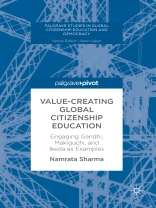This book fills an existing gap within the practice of global citizenship education by offering Asian perspectives. In this book, Soka or value-creating education developed by the Japanese educators, Tsunesaburo Makiguchi (1871-1944) and Daisaku Ikeda (b. 1928) is compared to the ideas of the Indian political leader Mahatma Gandhi (1869-1948). This study of their respective thoughts and movements has a significant bearing on the three domains of learning within the global citizenship education conceptual dimensions of UNESCO – the cognitive, socio-emotional, and behavioral. This book deftly combines theoretical discussions with themes and suggestions for practice and future research.
Содержание
1. Introduction.- 2. Makiguchi, Ikeda, and Gandhi: A Brief Comparative Study.- 3. Global Citizenship Education and Non-Western Perspectives.- 4. Revisiting the Concept of Dialogue in Global Citizenship Education.- 5. Can Active Citizenship Be Learned? Examining Content and Activities in a Teacher’s Education Module Engaging with Gandhi & Makiguchi.- 6. The Practice of Value-Creating Global Citizenship Education.- 7. Culminating Lessons, Moving Forward.- 8. Conclusions-Recommendations for Policy and Practice.
Об авторе
Namrata Sharma is Adjunct instructor at State University of New York, Oswego, USA and an international education consultant. Her research interests include intercultural education, global citizenship, and international and comparative education.












